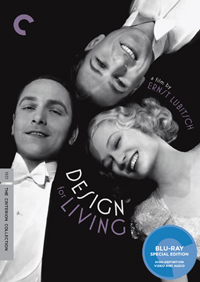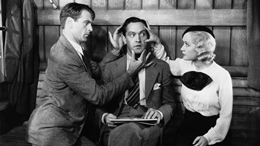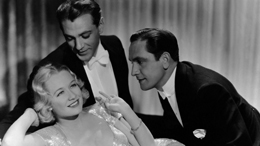Listening to the commentary on the new Criterion Collection Blu-ray restoration of director Ernst Lubitsch‘s pre-code delight Design For Living, I learned that when adapting films from other mediums, Lubitsch used the premise and little else.
 In 1933, he and screenwriter Ben Hecht did just that, and came up with a movie that is full of sophisticated attitudes about men, women, society, and is pretty damn frank about sex.
In 1933, he and screenwriter Ben Hecht did just that, and came up with a movie that is full of sophisticated attitudes about men, women, society, and is pretty damn frank about sex.
Of the movie based on his 1933 hit Broadway play Design For Living, Noël Coward said, “I’m told that there are three of my original lines left in the film – such original ones as ‘Pass the mustard’.”
Well, Coward needn’t have minded. The movie that bears his title and credit is pure cinematic gold, and the Criterion presentation is full of extra material that will help modern audiences appreciate how far ahead of its time this 1933 romantic comedy truly was.
The first thing that’s noticeable is the huge amount of sexual innuendo, an Ernst Lubitsch staple. For a director that became known for the witty banter in his movies, Design For Living opens unusually. Gary Cooper, Fredric March, and Miriam Hopkins share a scene on a train that is wordless for many minutes. When the characters do finally speak, it is in French.
Much like Ernst Lubitsch’s 1932 masterpiece Trouble in Paradise, Design For Living is about a love triangle. Rather than two thieves trying to con a rich heiress, however, Design For Living features the bohemian trio of three Americans — a playwright, and artist, and their muse, all living in Paris.
 The attraction is immediate, and the three play out all kinds of scenarios, despite the fact that each one knows heartbreak is around the corner for somebody. Then again, why should the constraints of modern society matter to artistic types?
The attraction is immediate, and the three play out all kinds of scenarios, despite the fact that each one knows heartbreak is around the corner for somebody. Then again, why should the constraints of modern society matter to artistic types?
Also, why should women be treated differently than a man in the same situation? Using the metaphor of trying on different hats, Miriam Hopkins some very funny dialogue about this double standard of the sexes — one that still remains today.
Design For Living is more than just a sophisticated romantic comedy. It’s a daring movie that satirizes sexual mores and heaps irony upon irony. If Hollywood tried to remake this movie today, they would probably take the ménage à trois set-up and strip away all the depth, so it cold be reduced to a high-concept piece of crap like Friends With Benefits.
 Ernst Lubitsch proved almost 80 years ago that you can take a high-concept situation and infuse it with enough poignancy and eroticism that it could be a truly adult film — not just a film with “adult” content like curse words and nudity.
Ernst Lubitsch proved almost 80 years ago that you can take a high-concept situation and infuse it with enough poignancy and eroticism that it could be a truly adult film — not just a film with “adult” content like curse words and nudity.
He also had something to say about the restrictions of the time. Sadly, the film’s criticisms trned out to be all too true, as Design For Living wasn’t made available for re-release after 1934 under strict new rules from the Hays Code.
Criterion’s new high-def digital restoration on DVD and Blu-ray features selected-scene commentary on the visual style of the movie and its predecessor Trouble in Paradise by film scholar William Paul.
Ernst Lubitsch’s segment of the 1932 omnibus film If I Had a Million (The Clerk, starring Charles Laughton) is also included, as well as the British television production of the play Design for Living from 1964, introduced on camera by playwright Noël Coward.
There’s also a new interview with film scholar and screenwriter Joseph McBride on Lubitsch and screenwriter Ben Hecht’s adaptation of the Coward play and an excellent, heartfelt admiration by film critic Kim Morgan.








Comments on this entry are closed.